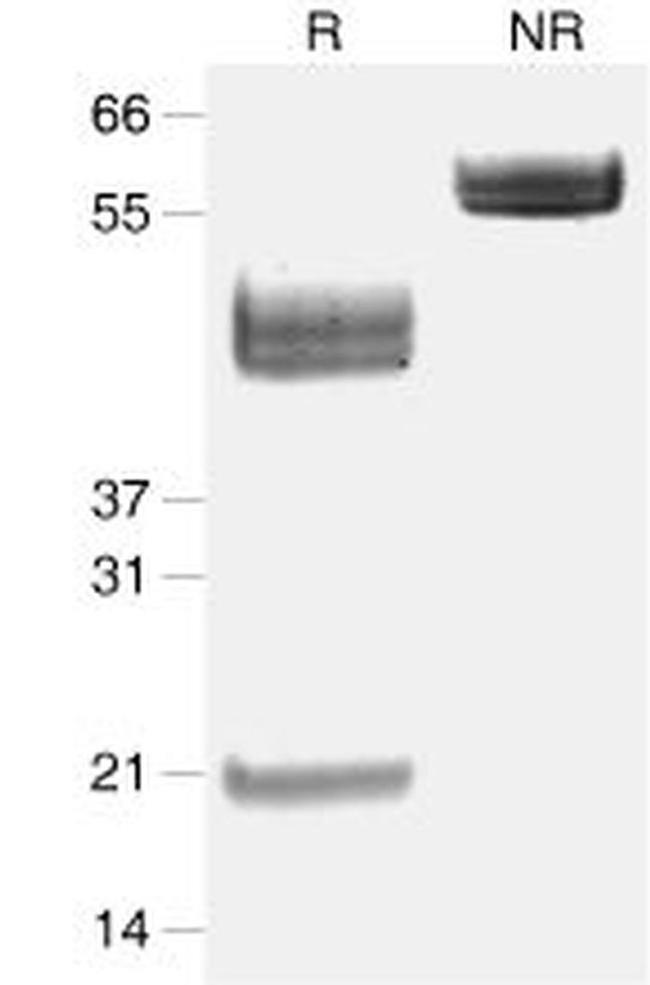Search Thermo Fisher Scientific
Invitrogen
Mouse IL-23 Recombinant Protein, eBioscience™
Product Details
14-8231-63
Species
Published species
Expression System
Amino acid sequence
Molecular weight
Class
Type
Purity
Endotoxin concentration
Activity
Conjugate
Form
Concentration
Purification
Storage buffer
Contains
Storage conditions
Shipping conditions
Product Specific Information
Description: IL-23 is a heterodimeric cytokine composed of the p40 subunit of IL-12 disulfide-linked with a protein p19. p19, like p35 of IL-12, is biologically inactive by itself. IL-23 interacts with IL-12Rbeta1 and an additional, novel beta2-like receptor subunit with STAT4 binding domain, termed IL-23R. IL-23 is secreted by activated mouse and human dendritic cells. Biological activities of mouse IL-23 are distinct from those of mouse IL-12. Mouse IL-23 was found not to induce significant amounts of IFN-gamma. Mouse IL-23 does induce strong proliferation of memory T cells (but not naive T cells), whereas IL-12 has no effect on memory cells. Additionally, mouse IL-23 (but not IL-12) can activate mouse memory T cells to produce the proinflammatory cytokine IL-17. Human IL-23 has biological properties which are less distinct from human IL-12; human IL-23 induces proliferation of memory T cells and induces moderate levels of IFN-gamma production by naive and memory T cells, as compared to IL-12.
Applications Reported: Recombinant mouse IL-23 is biologically active.
Applications Tested: The ED50 of this protein, as measured by IL-17A induction in mouse splenocytes, is less than or equal to 625 pg/mL. This corresponds to a specific activity of greater than 1.5 x 10e6 Units/mg.
Source: Insect cells infected with baculovirus: mouse p40, amino acids met 1-Ser 355, accession # NM_008352 was co-expressed with mouse p19, amino acids met 1-Ala 196, accession # AF301619.
Bioactivity: The ED50 of this protein, as measured by IL-17A induction in mouse splenocytes, is less than or equal to 625 pg/mL. This corresponds to a specific activity of greater than 1.5 x 10e6 Units/mg.
Endotoxin: Less than 0.01 ng/ug cytokine as determined by the LAL assay. Purity: >98% as determined by SDS-PAGE.
Molecular Weight: The heterodimer of p40, amino acids met23-ser335, cystine-linked to p19, amino acids leu 20-ala 196, has a predicted molecular mass of 55,616. On non-reducing SDS-PAGE the heterodimeric cystine-linked protein migrates as a 60 kDa protein. The DTT reduced protein migrates as 43 kDa and 21 kDa polypeptides.
Storage and handling: For best recovery, quick-spin vial prior to opening. Use in a sterile environment.
Purity: Greater than 90%, as determined by SDS-PAGE.
Aggregation: Less than 10%, as determined by HPLC.
Filtration: 0.2 µm post-manufacturing filtered.
Target Information
IL-23 is a heterodimeric cytokine composed of the p40 subunit of IL-12 disulfide-linked with a protein p19. p19, like p35 of IL-12, is biologically inactive by itself. IL-23 interacts with IL-12Rbeta1 and an additional, novel beta2-like receptor subunit with STAT4 binding domain, termed IL-23R. IL-23 is secreted by activated mouse and human dendritic cells. Biological activities of mouse IL-23 are distinct from those of mouse IL-12. Mouse IL-23 was found not to induce significant amounts of IFN-γ. Mouse IL-23 does induce strong proliferation of memory T cells (but not naive T cells), whereas IL-12 has no effect on memory cells. Additionally, mouse IL-23 (but not IL-12) can activate mouse memory T cells to produce the proinflammatory cytokine IL-17. Human IL-23 has biological properties which are less distinct from human IL-12; human IL-23 induces proliferation of memory T cells and induces moderate levels of IFN-γ production by naive and memory T cells, as compared to IL-12.
For Research Use Only. Not for use in diagnostic procedures. Not for resale without express authorization.
Bioinformatics
Protein Aliases: il 23; IL 23 A; Il-12b; Il-12p40; IL-23 subunit alpha; IL-23-A; IL-23p19; IL12B; Il12p40; il23; ILN; Interleukin; interleukin 12B; Interleukin-23 subunit alpha; Interleukin-23 subunit p19; MGC79388; RP23-388G23.1
Gene Aliases: IL-23; Il23a; p19
UniProt ID: (Mouse) Q9EQ14
Entrez Gene ID: (Mouse) 83430

We're here to help
Get expert recommendations for common problems or connect directly with an on staff expert for technical assistance related to applications, equipment and general product use.
Contact tech support

